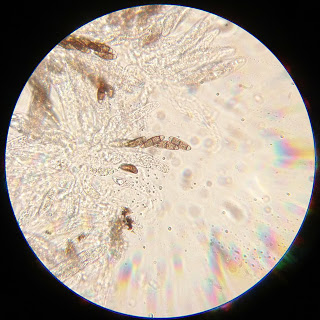These mushrooms were all growing from a sizeable chunk of dead wood lying around on the woodland floor. Out in the woods I managed to convince myself they're all the same species, but I don't know what I based that theory on as they look pretty different in the pictures.
I took a specimen of the mushroom in the foreground of the second picture. Here's the cap up close:
Obvious features are:
- Cap dry and mousy brown
- Gills creamy-beige, spotted brown, rather distant and I think they'd be described as sinuate.
- Stipe cream, changing to brown towards the base
I think it's somewhere near the Mycenas, but I'm not going to hazard a guess at species.
A little further on, some more mushrooms growing emerging from a dead wood substrate, mixed in with Candlesnuff Xylaria hypoxylon.
I didn't get a specimen of these as most of the fruiting bodies were getting rather old and leathery, and the fruiting body in the foreground looked a little on the young side. It wasn't much more than a centimetre across.
Features I observed included:
- Dry, yellow-orange cap
- Yellow gills, which looked fairly crowded on the young fruiting body
- Yellow-brown stipe with a ring (the stipe didn't seem particularly fragile)
Wondering if this is Funeral Bell Galerina marginata. But I'm not sure.
Then another slightly non-descript mushroom. This time growing in tight clusters.
Features include:
- Grey-brown cap
- White-cream gills with white cross-veins growing over/between the gills.
- White-cream stipe
Yup, you guessed it. I don't know what this mushroom is either.
Finally something a little more distinctive.
I think this is Peeling Oysterling Crepidotus mollis. The stretchy cuticle peeled away cleanly from the cap.
I recognised this black (so very black) fungus from a previous Sussex Fungus Group foray. It is... peculiarly black.
When you get it under a hand lens or stereo-microscope you can see masses of tiny black round fruiting bodies (perithecia).
They have quite interesting spores. I think this is Chaetosphaerella phaeostroma.
On the way back, growing next to an overgrown hazel coppice stool, next to the path which runs from Horton Wood to New Hall Lane, I came across these white mushrooms.
- Cap - white-cream
- Gills - white-cream and decurrent, although tending to peel away from the cap near the stipe, as the fruit body dries out.
- Stipe - white-cream
- Smell - mushroomy
Not sure what these are either at the moment. Some kind of Funnel Clitocybe?
For the record
Date: 3 December 2016
Location: Horton Wood, Small Dole
Grid reference: TQ208127 (site centroid)
Entered into FRDBI: 12/02/2017


















Hey Clare,
ReplyDeleteYep, you remembered Chaetosphaerella phaeostroma well. I think Ascospores tend to much more interesting than Basidiospores. Plus this species comes with vicious-looking black spears, which is obviously a bonus.
You got Galerina marginata right, too.
I can't offer much more with regards to the funnel. Perhaps Clitocybe phyllophila? (I don't have a firm concept of this species). Too often I take home Clitocybe species that look like this only to find that they're actually Clitopilus prunulus, a species with quite distinctive pink spores that are angular, but only in face view (in side view, they have longitudinal ridges).
I would have walked past those Mycenas :)
Nick
Thanks Nick! Really appreciate the feedback. Chuffed I got Galerina marginata right. Clare
Delete